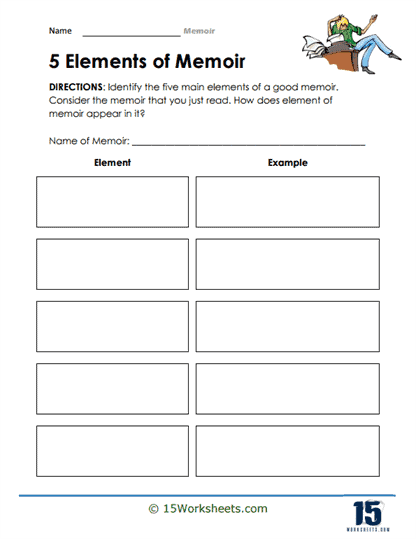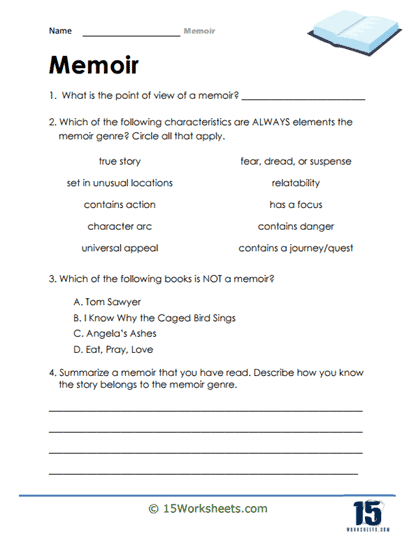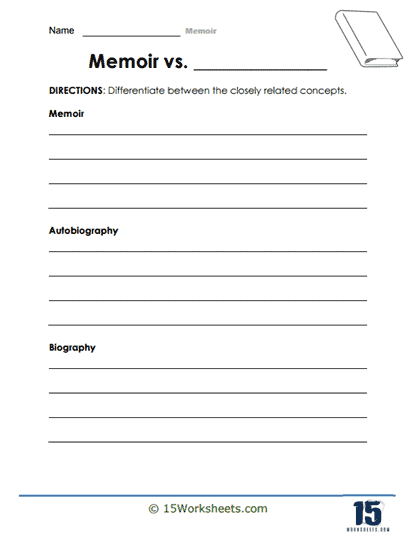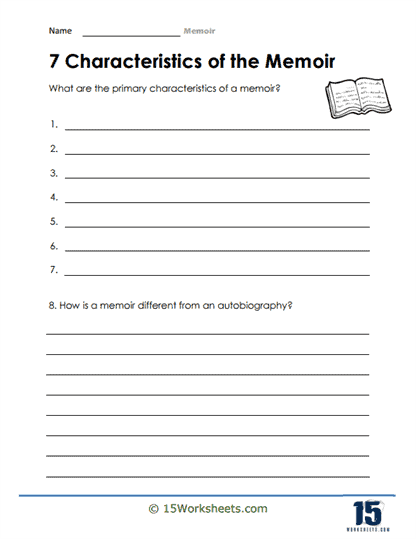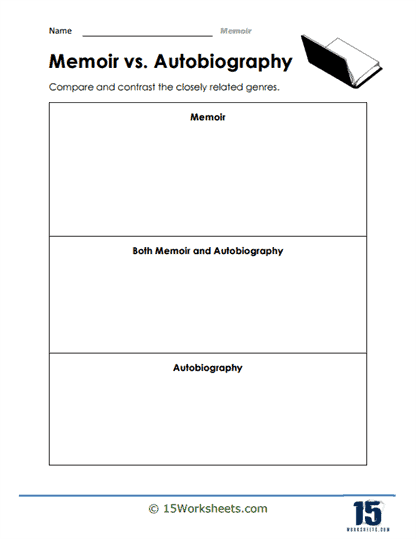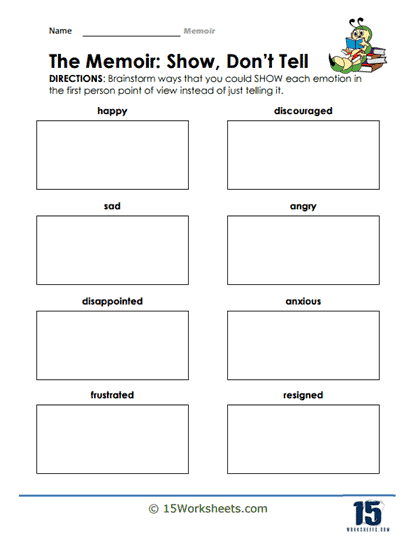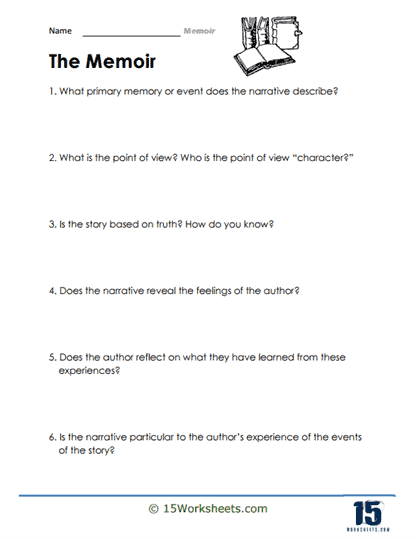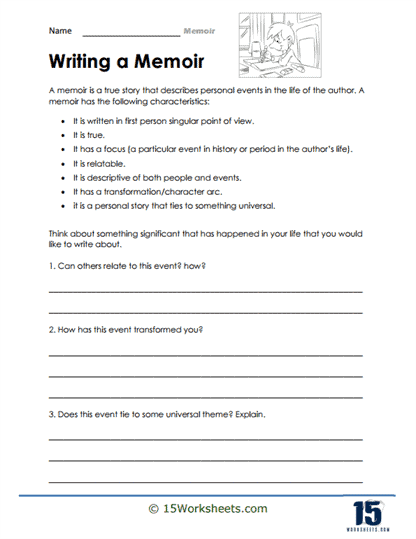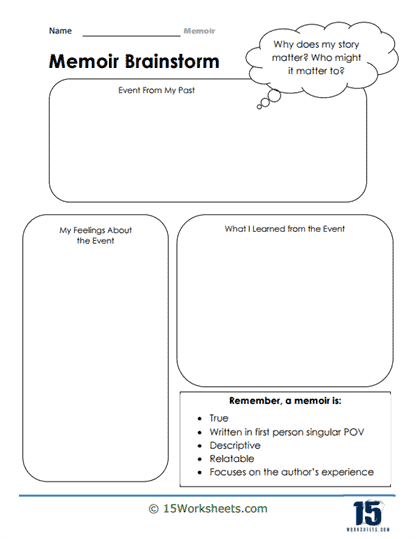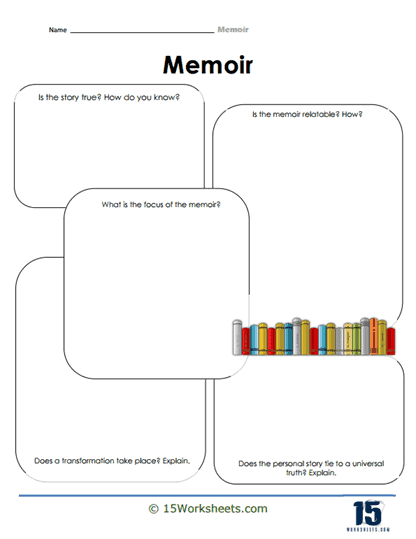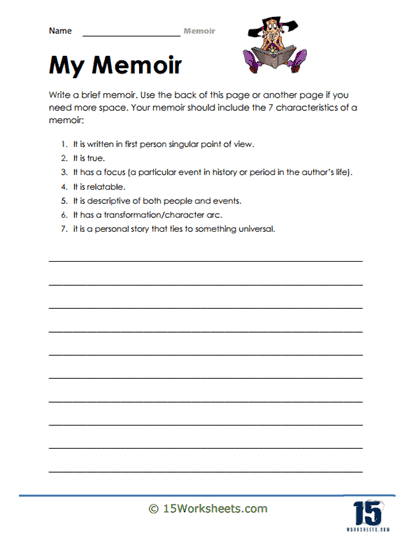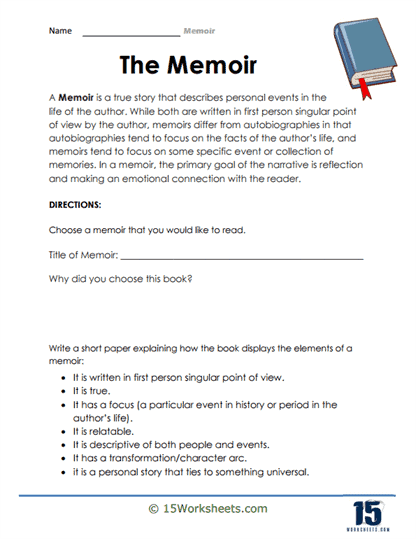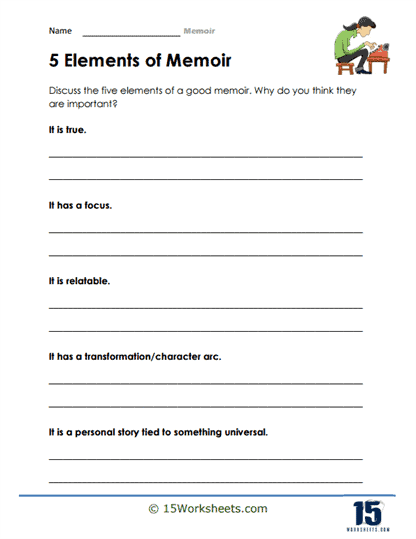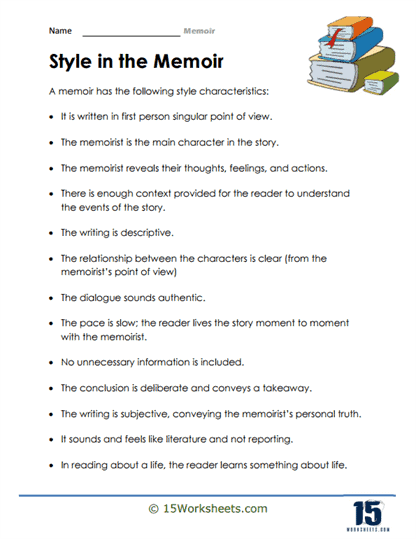Memoir Worksheets
All About These 15 Worksheets
Memoirs, a genre of autobiographical writing that explores personal experiences, reflections, and emotions, offer students a unique opportunity to connect with the human experience through storytelling.
Understanding memoirs is not only important for literary appreciation but also for honing writing skills, fostering empathy, and promoting self-reflection. This collection of 15 worksheets is designed to introduce students to the world of memoirs, helping them grasp the importance of this genre, recognize its elements, and develop their own memoir-writing abilities.
A memoir is a special kind of book where people write down their memories so they can share them with others! These worksheets can help your child develop both their writing and critical thinking skills. They’ll be able to reflect on their experiences, organize their thoughts, and learn to express themselves clearly and coherently.
Here are some exercises you will come across on our memoir worksheets:
Topic Brainstorming – This is a space for your child to write down all the memories or experiences they might want to write about. It could be a family vacation, a school event, or even just a regular day that turned out to be special!
Timeline Creation – This exercise helps organize the events of the memoir in chronological order. It’s a good way to practice sequencing events and understanding narrative flow.
Sensory Detail Description – This could involve writing about what things looked, sounded, smelled, felt, or tasted like in the memory. This helps make the writing more engaging and realistic!
Reflection Writing – This section encourages kids to think about why this memory is important to them, what they learned from it, or how it made them feel. This is a key part of memoir writing!
Drafting and Revisions – Finally, your child would write their memoir using all the ideas and details they’ve gathered. Then, they would revise it, making sure everything makes sense and is well-explained.
Why Do Authors Use Memoir As a Literary Device?
A memoir is a collection of memories that an individual writes about moments or events, both public or private, that took place in their life. It’s a sub-genre of non-fiction, where authors detail their experiences, but it’s distinct from an autobiography due to its less formal structure and its focus on personal stories and reflection rather than the chronological account of a life. Memoirs are often imbued with the author’s personal insights, emotions, and an intimate perspective that invites readers to step into their world for a moment.
The main defining feature of a memoir is its emphasis on memory, personal knowledge, and intimate experience. It’s not just about the facts, but about the author’s internal and subjective perspective. Memoirs often focus on a specific aspect, theme, event, or period in an author’s life, making it distinct from autobiographies, which typically cover the author’s entire lifespan in a more objective manner.
Examples of Memoirs in Literature
“The Diary of a Young Girl” by Anne Frank
This memoir is perhaps one of the most famous examples. Written by Anne Frank, a Jewish girl, during the Holocaust while she was in hiding with her family, it presents a harrowing firsthand account of the fear, hope, and despair experienced during one of the darkest times in human history. Anne’s insights, maturity, and the vivid picture of life in hiding she paints go far beyond the historical facts of the Holocaust. Her memoir brings to life the emotional reality of her experiences, making the impact of the Holocaust deeply personal for readers, and ensuring we remember the human lives affected, not just the facts and figures.
“Eat, Pray, Love” by Elizabeth Gilbert
In contrast, “Eat, Pray, Love” is a modern memoir by Elizabeth Gilbert that chronicles her journey across the world in search of solace and personal growth after a painful divorce. Gilbert’s memoir engages readers through her candid recounting of the struggles she faced and her pursuit of fulfillment. This memoir showcases the transformative power of travel and self-reflection, making it a deeply personal narrative that many readers have found relatable.
“I Know Why the Caged Bird Sings” by Maya Angelou
Maya Angelou’s memoir, “I Know Why the Caged Bird Sings,” recounts her early life and adolescence, addressing subjects like identity, rape, racism, and literacy. It illustrates how strength of character and a love of literature can help overcome racism and trauma. This memoir not only captures Angelou’s personal experience but also the broader social and cultural atmosphere of America at the time.
In each instance, the authors use the memoir form to invite readers into their personal world. Through their memories and experiences, readers can gain a deeper understanding of historical events, personal transformation, or societal issues.
Each author has a unique story, and through their memoir, they share not just the events, but their emotional journey, personal growth, and insights they gained. This makes memoirs a powerful tool for building empathy and understanding, giving readers a window into experiences and perspectives that may be vastly different from their own. It’s also a testament to the power of the individual in shaping our collective understanding and empathy.
The Importance Of Studying Memoir For Students
Exploring the world of memoirs through this collection of 15 engaging worksheets offers students an opportunity to develop essential skills in literary appreciation, writing proficiency, self-reflection, empathy, and historical awareness.
Memoirs provide a gateway to understanding the human experience through personal narratives, making literature and storytelling accessible to all students. By engaging with these exercises and activities, students not only enhance their academic abilities but also gain valuable tools for self-expression, empathy, and a deeper understanding of the world around them. The benefits of studying memoirs extend far beyond the classroom, empowering students to be more thoughtful, expressive, and compassionate individuals in their academic, personal, and professional lives.

